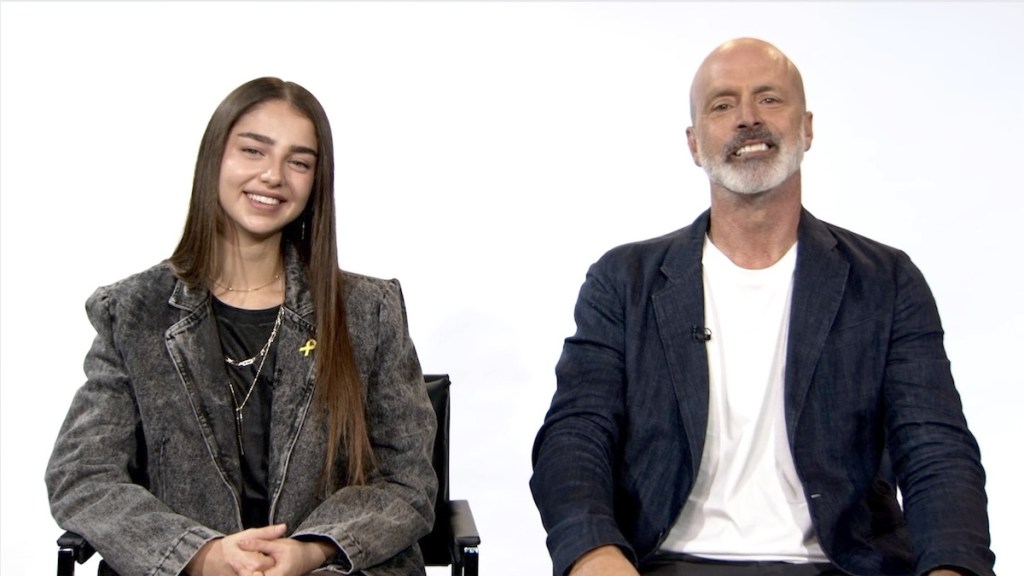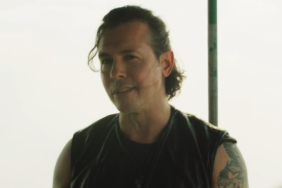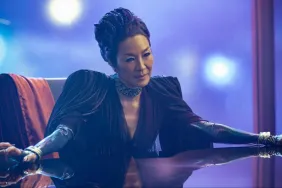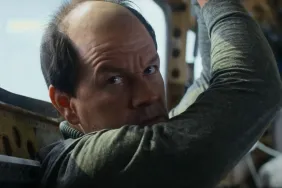Netflix’s biblical epic Mary is now streaming. Directed by D.J. Caruso (Disturbia, Eagle Eye) and starring Noa Cohen in the lead role, the film is a new look at the life of Jesus’ mother. ComingSoon spoke to the duo about the film and working with Anthony Hopkins, who plays the villainous King Herod.
“Mary is a coming-of-age biblical epic in which Mary (Noa Cohen) is shunned following a miraculous conception and forced into hiding. When King Herod ignites a murderous pursuit for her newborn baby Jesus, Mary and Joseph go on the run – bound by faith and driven by courage – to save his life at all costs,” reads the logline.
Tyler Treese: D.J., I read that you’re Catholic, so obviously, you grew up knowing this story, but this also feels fresh and presented in a new way. How was it finding your way into this familiar story but presenting it in a way that both religious and non-religious viewers could really get invested in Mary’s journey and enjoy it?
D.J. Caruso: Yeah. Obviously, I have a Catholic background, so I’m very familiar with Mary and she represents something to me that’s very vital and important. But most importantly, it’s really the character in this young woman. I thought, if I can grab that and get the audience immersed in her story — because I’ve seen so many Mary movies or movies that have Mary that are sort of far removed that it’s sort of the Christmas card painting that we all think we all know — I wanted to jump into the story and really tell a story of a young woman who had courage, who had hope, who also had apprehensions and had fears. So, in telling that story, it’s really the character of Mary that was speaking to me as a filmmaker, really driving all the decisions and how we make them.
Also, knowing that no matter what you do, there’s gonna be someone who’s gonna nitpick this because it’s the Bible. It’s a story they know, but if you tell a story for the right reasons and you’re really celebrating who she is and and celebrating her courage and what she did, then the movie’s for everybody. If you don’t have a religious background or you’re not really faithful, it doesn’t really matter because you have this incredible mythological story of a young woman who is chosen to do something, accepts that she’s gonna do this, and all the forces are gonna try to stop her to take it. Also, the geopolitical aspects of the world. So there’s a really lot of movie in there for people of faith and for people who aren’t as faithful to see like, “Wow, this is an incredible young woman.”
Noa, D.J. just mentioned so many human traits that Mary has that you probably grappled with in your performance, but there’s just an enormous weight when you’re playing Mary. She’s the mother of Jesus. So, how was it kind of finding your way into that role? Because there’s so much history and spirituality there that could almost be overwhelming,
Noa Cohen: It was overwhelming at first. I’m not gonna lie. But when I started working with D.J. together on figuring out what we wanted this film to be and what we wanted the message to be, we really wanted to make sure we portrayed her in a way that the audience would be able to connect with on a deeply human level. So our main focus and our main work was figuring out who she was as a person, as a young woman, navigating through those challenges, not just the divine ones, but also the very human ones that she had to face. These are challenges that every young woman I think can relate to — not just women — but this was really, really important to us because I knew that this was the key to bringing her to life on screen, finding that balance between her divine role and her humanity.
D.J., you’ve worked with some truly great actors in the past, but it doesn’t get better than Anthony Hopkins. He’s so intense in this role. How is it seeing just how much he still has to offer, even in his eighties? He’s incredible.
Caruso: Yeah, he’s 86 years old, and we were talking about this before. He comes to work, and when he gets on the set, he’s a teenager just seeing the camera. It’s where he belongs. He’s just such a creative force. Noa and I were talking about it, he is fearless. Like one take could be this way, one take could be another way. He’s just trying to play, find things, and work. But it was such an honor for me to see because I have worked with great actors, so it’s always interesting for me to say, “How do I create an environment for him to succeed? What does he need from me?” Really understanding that a lot of what he does is in preparation. Then, when he does all his prep, he just comes in there, and he just lets it fly. It was really beautiful to watch.
Cohen: It really was inspiring.
How was it seeing him work, Noa?
Cohen: As a younger artist, it, it was truly amazing, very inspiring to watch him work. As D.J. said before, he does a little something different each and every take. I don’t know how he does it, but it was incredible to watch. One take can be fantastic. The other one can be not as good, the other one can be questionable. Then at the end of the day, it turns out fantastic. He truly is fearless, and this is something that I took away from him.
Caruso: It reminds me, there’s a really powerful moment in the film when Noa, Mary, and Herod, Anthony Hopkins characters see each other for the first time. It’s the only time in my career that I shot both angles at the same time. So we’re pushing in slowly on Herod and I was on B camera pushing slowly on Noa. For me, it was interesting because you have this young, up-and-coming amazing actress, and you have this icon. To see the moment that they both see each other and stare — to shoot that simultaneously, not do one take and not do another, but to do it at the same time was really enlightening as a director. It was really fun to see the sort of… I don’t wanna say the changing of the guard, but just to see these generations work together in the same scene at two different frames.
Thanks to D.J. Caruso and Noa Cohen for taking the time to talk about Mary, which is now streaming on Netflix.











